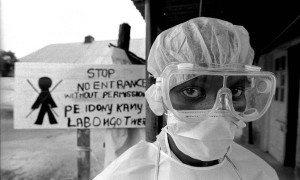 Originally posted at Clash Daily
Originally posted at Clash Daily
Dr. Kent Brantly and Nancy Writebol are impressive people. After all, they obeyed God’s call to minister to the “least of these” as missionaries to Liberia. Dr. Brantly grew in stature when, after contracting the deadly Ebola virus, he decided to forfeit an experimental serum so that 60-year-old Writebol could have the first available dose.
Then, that night while the second sub-zero serum thawed, Brantly suddenly took a turn for the worse and was quickly administered the initial dose he had originally turned down. This is a man willing to go last and as a result, as promised, ended up going first.
Certain he was dying, he called his wife to say good-bye. But about an hour later Brantly received the IV serum, and within 20 minutes could breathe easier and his Ebola rash started to clear up. The next morning the doctor took a shower, was flown home on a Gulfstream air ambulance, and upon arrival at Georgia’s Emory University Hospital donned in a Hazmat suit, stepped out of the ambulance, and walked unassisted into the hospital.
According to the Los Angeles Times, Mapp Biopharmaceutical Inc. of San Diego, California manufactured the drug Brantly received. The trial serum named Zmapp “is a cocktail of three ‘humanized’ monoclonal antibodies that are manufactured in a group of fragrant plants or bushes known by the genus name Nicotiana.”
So, thanks to the grace of God, both missionaries received the experimental drug. Dr. Kent Brantly of Samaritan’s Purse is on the mend and Service in Mission worker Nancy Writebol, who arrived at Emory on a stretcher, is improving at a slower pace.
What is amazing about the story is that after offering themselves as servants of God to “wash feet” on the mean streets of Ebola-stricken Liberia, both of these devout Christians then freely offered their lives a second time by agreeing to be the first human specimens to test the tobacco-derived experimental serum, which for all intents and purposes. could have cost them their lives.
So far, the serum hasn’t killed Brantly and Writebol; instead it delivered a “miraculous” outcome and may have saved their lives.
So now that the outlook has improved and it appears that these two individuals will have a testimony to share, the political posturing has begun, and predictably the bluster involves accusations of racism. Why did the white people get the medicine while all those black people were dying?
Forget the survival story, or the fact that two white caregivers risked their lives to serve poor black people in West Africa. The question that is now being raised by some is why thousands of black Africans died, while two white Americans quickly received a lifesaving serum.
Erin Burnett of CNN’s OutFront got out-front when she broached that exact subject. Ms. Burnett presented Dr. Sanjay Gupta with the following question about why Brantly and Writebol received the extraordinary remedy:
I know it’s miraculous. I know it was untested, that it was very risky, but what about everyone else? I mean (stammering), nearly a thousand have died, all of them Africans! Suddenly two white Americans, um, get the disease, and — and suddenly all the stops get pulled out?
For clarification, “everyone else” is everyone other than the two white Christians who received the brand-new serum. Ms. Burnett sounded as though she actually thought that Ebola might have killed a thousand people merely because they lived in Africa and are black.
It’s apparent that Ms. Burnett was unaware that Patrick Sawyer, the first American citizen to contract the Ebola virus, was black. Unfortunately, Sawyer died before anyone could offer the ZMapp serum, and his race had nothing to do with it.
As for all the stops getting pulled out – does it count that Brantly and Writebol offered themselves as lab rats to test a serum that has never been tested on any human? Or that, since the epidemic is concentrated in Africa, thanks to the bravery of two white missionaries, mostly black lives will be saved?
Based on her uncalled-for suggestion, if the serum had been tested on a black Ebola victim first, instead of taking a stand for unbiased “serum equity”, Erin Burnett would have probably accused the CDC of “experimental racism” for using black Africans as guinea pigs.
Dr. Gupta replied to Burnett that she should “Keep in mind, this had never been done before,” and that “[Brantly] was the first human” to try the serum. If Burnett were an actual journalist and not a agitator, the fact that Brantly was the first human volunteer to receive the risky drug would have been the emphasis of her comments, not that he was a white American.
Despite the racist accusations that are likely to surface in the coming days, thankfully two dedicated servants selflessly bringing the Gospel to West Africa were infected with Ebola but faced down death and used the opportunity to take a step of faith. That courageous decision on their part has provided hope in the midst of a deadly epidemic for all people, regardless of their color.
